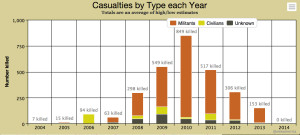By HOMA BASH
WASHINGTON – A lack of transparency by the Obama administration regarding drone strikes in Pakistan and Yemen is adding another layer of fog to U.S. military involvement overseas, critics say.
Drone strikes began in Yemen in 2002 and in Pakistan in 2004. Since then, between 34 and 84 civilians have been killed in Yemen, according to the Bureau of Investigative Journalism. In Pakistan, the figures range from 416 to 957 civilian deaths.
The wide variances stem from government officials in Yemen, Pakistan and the United States keeping their lips tightly sealed when it comes to drone strikes, often citing national security concerns.
Civilian casualties from drone strikes in Yemen were at the highest point in 2013, according to the New America Foundation, a nonprofit public policy institute based in Washington, D.C.
That’s in large part due to a single drone strike that reportedly killed a dozen people in a wedding procession on December 12, 2013.
But more than five months later, it is still unclear whether those killed were dangerous militants, as the U.S. government has previously stated, or simply civilian men accompanying a bride to her wedding, as various watchdog groups and media reports have stated.
“If the U.S. wanted to resolve this – clearly, definitively, on the record – I’m sure they have the information,” said Letta Tayler, senior terrorism and counterterrorism expert at Human Rights Watch, a Washington-based advocacy group. “Why they don’t choose to do so? I don’t have a crystal ball, I don’t know their motivations.”
In a 28-page report titled “A Wedding That Became a Funeral,” released on Feb. 19, Tayler examined that particular strike and called on the United States government to investigate – and most importantly, release those findings to the public.
The administration has not formally announced an investigation or publicly acknowledged the strike, Tayler stated.
The report is based on research conducted over the course of six days in January, during which researchers interviewed more than 25 people, including eight relatives of those killed or wounded in the Dec. 12 attack.
The report stated that the attack, carried out by the U.S military’s Joint Special Operations Command (JSOC), resulted in the death of 12 men and wounded at least 15 others. According to Tayler and other reports, four Hellfire missiles were launched on a convoy of 11 cars in rural Yemen by an aerial drone.
Tayler also wrote that the attack contradicted requirements of targeted drone strikes outlined by President Barack Obama in May 2013, which were that “the United States must have ‘near certainty’ that no civilians be harmed.”
Tayler said that while she has seen no evidence of an investigation on the ground, it doesn’t necessarily mean the government isn’t conducting one. But the refusal to release any concrete details muddles how closely the U.S. is – or isn’t – obeying the laws of war.
“We don’t know because we don’t have access to all of the information,” she said.
“That’s why it’s critical that the U.S. start coming forward with basic information about these strikes,” Tayler added. “How many people killed? How many strikes gone wrong? What is the U.S. doing about it when the strikes go wrong?”
And not only may the strikes be potentially unlawful, Tayler added, they may also be “dumb policy” and counterproductive because they are turning potential allies into potential enemies.
“Strikes that kill civilians are creating a backlash in Yemen,” she said. “The U.S. refusal to acknowledge these strikes and publically apologize is increasing the anger.”
Ivan Eland, senior fellow at the Center on Peace and Liberty, agreed. In an op-ed for Huffington Post on April 23, Eland wrote, “Lastly, and most important, even if the United States thinks it is doing Yemen a favor by ridding it of Islamist radicals, while keeping civilian casualties to a minimum, Yemenis see only a foreign imperial power killing fellow countrymen and women.”
And when that foreign imperial power starts to look just as dangerous to Yemeni citizens as a terrorist group, Tayler said, the U.S. has a serious problem on its hands.
“I had many Yemenis tell me they fear the U.S. government as much as or more than they fear al-Qaeda in the Arab Peninsula,” she said.







